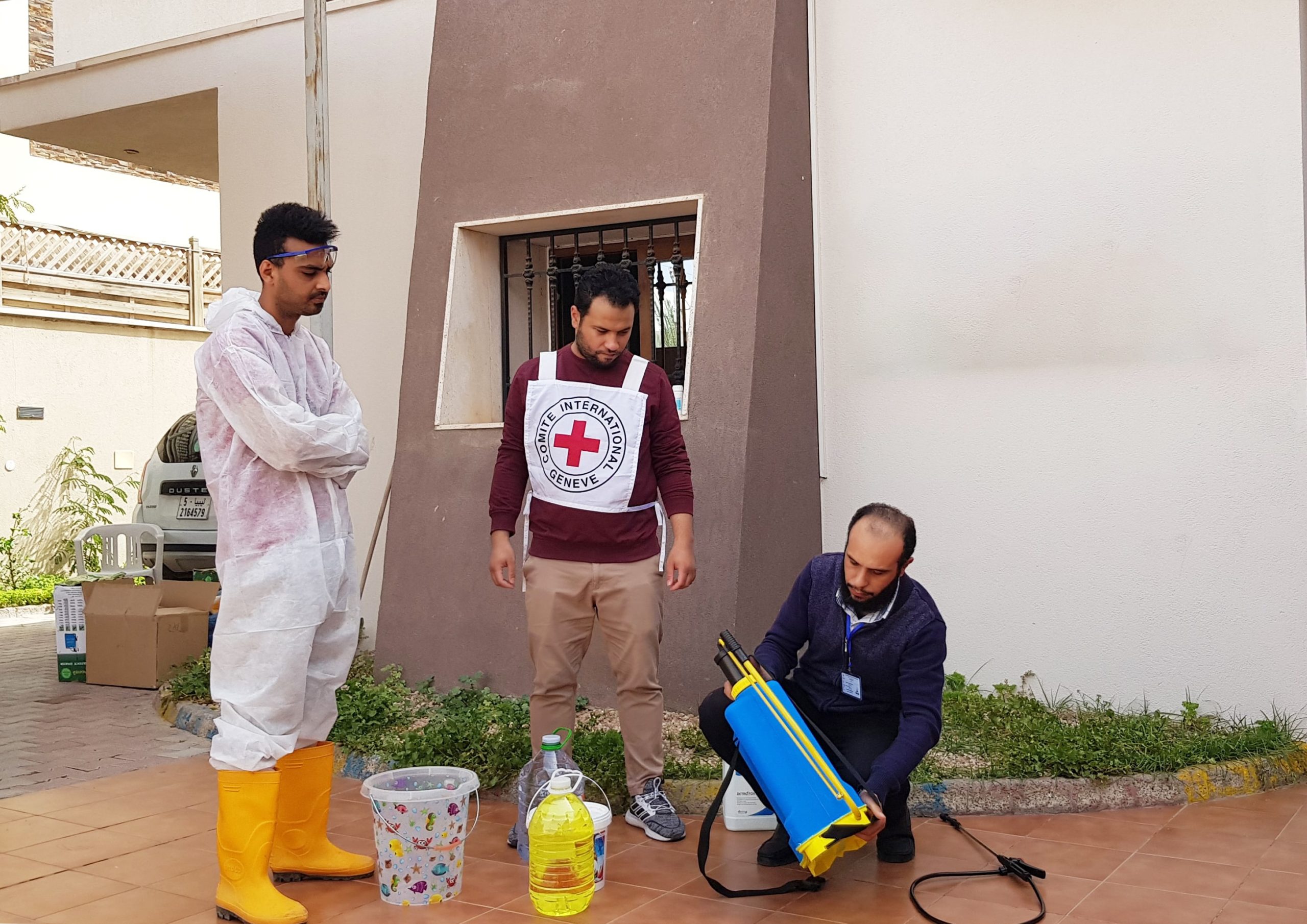
COVID-19 disinfection training for the Military Medical Services in Tripoli. Photo credit: ICRC/Hashim Alsharif
Until recently, Libya was a middle-income country that did not need humanitarian aid. However, with a crumbling health system, minimal social services, and poor water and sanitation near coastal areas, it now faces a pandemic. This situation means that humanitarians have become essential actors responding to COVID-19 in Libya, but they are facing enormous challenges when providing assistance.
On 25 August 2020, the Centre of Competence on Humanitarian Negotiation (CCHN) hosted a live, interactive session on the challenges posed by the COVID-19 pandemic and its impact on humanitarian work in Libya. The session provided a platform for humanitarians to discuss the external and internal access constraints they face in the country.
The discussion was opened by the CCHN Director, Claude Bruderlein, who gave an overview of the current situation in Libya. This was followed by a keynote presentation from the ICRC President, Peter Maurer, who shared his observations following a recent visit. Humanitarians working in Libya then shared their experiences, and their contributions were followed by an interactive discussion among all participants, which was facilitated by the CCHN Negotiation Support Specialist – Africa, Hanalia Ferhan.
Diplomatic efforts to stabilize an ongoing crisis
During his recent visit to Libya, Peter Maurer observed many challenges in what is a very complex situation. With an underdeveloped health system, Libya’s capacity to respond to a pandemic is limited. The country has also had to deal with a displacement and migration crisis. His visit focused on linking the humanitarian sector with diplomatic efforts by bringing key actors into the conversation with humanitarian organizations. He provided the following insight, “If there is a small space opening, with regard to the stabilization of the military and security front, which allows us as humanitarians to step in – now is the moment to seize the opportunity, given the depth and the multifaceted character of the crisis. It is also a great moment to give meaning to the humanitarian–development nexus [in Libya].
Overall, the main challenges Peter observed were the extent of the destruction and the number of displaced people. His main message for humanitarians working in Libya is to build a broad understanding of the social dynamics at play and to engage with local people as much as possible.
Dealing with the reality in Libya
Following Peter’s welcome and briefing, a series of speakers from humanitarian agencies working in Libya shared their perspectives on the humanitarian situation.
Ahmed Jamhour, the deputy head of mission for Première Urgence Internationale, talked about how corruption and governance issues affect how humanitarian organizations reach people in need. He explained that government corruption often means funds dedicated to the COVID-19 response do not reach the intended beneficiaries. This puts pressure on humanitarian organizations to close the gap left by the Libyan authorities and, instead of focusing on meeting the needs they had originally identified, many organizations tend to overextend their own capacities.
Despite corruption, the authorities have been more willing to remove administrative barriers in order to facilitate access and to encourage humanitarian organizations to respond to the challenges. Ahmed also explained that governments in the east and west have created many different entities to coordinate the response to the COVID-19 pandemic. This has made the situation more difficult for humanitarian organizations in terms of access; they often find themselves caught between different entities and they are sent from pillar to post in order to obtain the authorizations they need. He explained, “There are no standardized measures in the east or west of the country. This is the biggest issue in Libya: there are no guidelines for most processes.”
Stigmatization has an impact on access
COVID-19 restrictions have severely impacted the ability of humanitarian organizations to provide many of their normal, routine services, says Ann Marie McKenzie, who works as a protection sector co-coordinator with the Danish Refugee Council. Ann Marie explains that services provided face to face have been particularly affected. Even when organizations have adopted remote ways of working, delivering services remotely has been difficult. Delivering sensitive services, such as support for survivors of gender-based violence, has been especially difficult because of confidentiality and connectivity issues.
Ann Marie explained that communities have also experienced heightened marginalization, stigmatization, and discrimination because of the virus. This reflects a global trend and one that has particularly affected refugees and migrants. These communities are being stigmatized because they are perceived as carriers of COVID-19. Because of this, refugees and migrants are afraid to access the services they need, such as health care.
Ann Marie also touched upon stigmatization between Libyan communities and mentioned that health-care providers are not being allowed into communities because of the fear that this will spread the virus. This has made it difficult to establish the facilities needed to respond to the pandemic, which, in turn, prevents people from accessing the help they need. Ann Marie explained, “The situation [in Libya] is double-sided: the humanitarian organizations cannot access beneficiaries and, in turn, beneficiaries can’t access the assistance that they need.”
